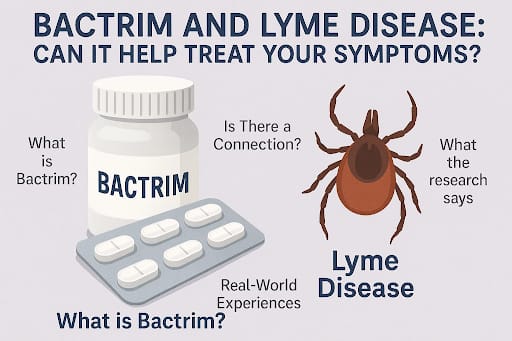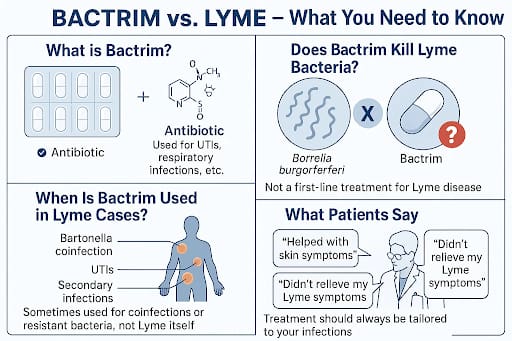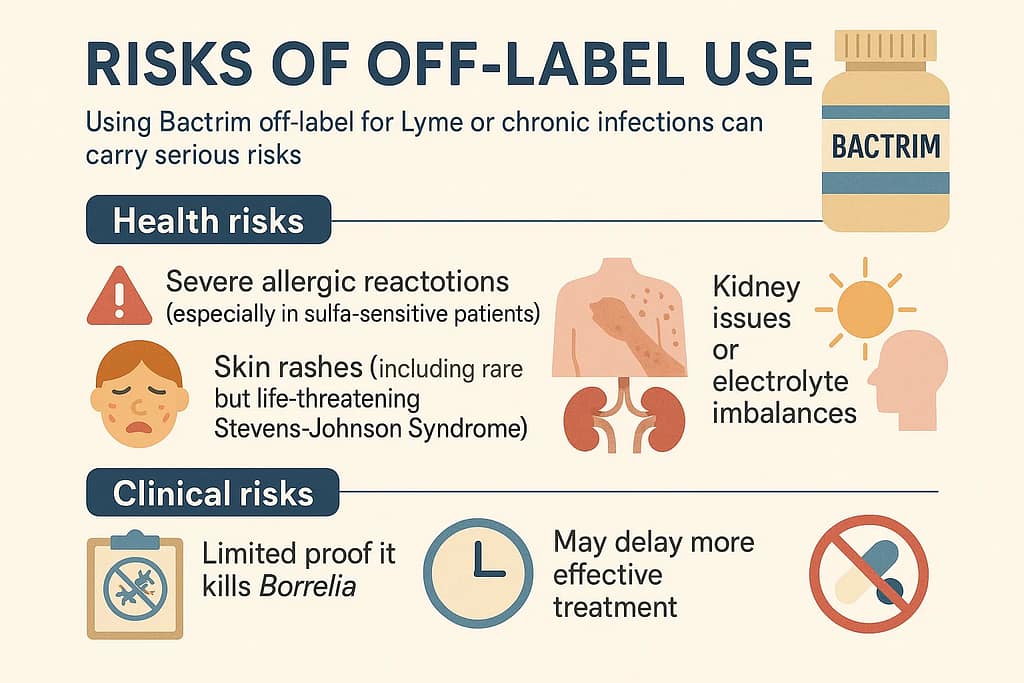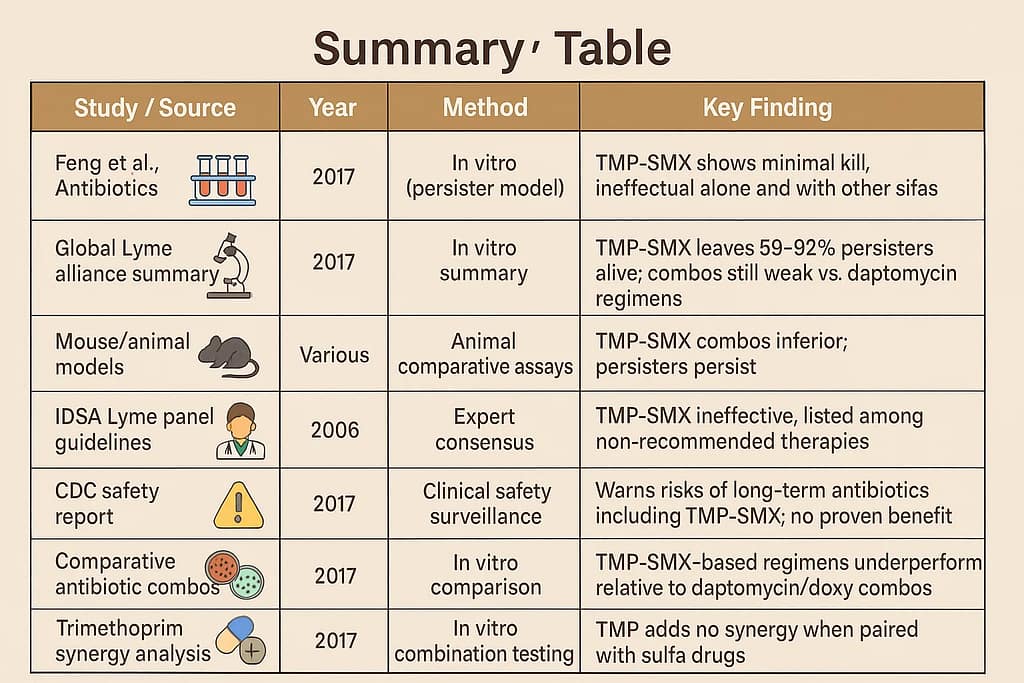
Introduction
The antibiotic no one ever expected- but literally some Lyme patients have cured themselves by it. When an individual is battling with Lyme disease, every treatment plan or regimen or every medication or approach that person takes feels like a gamble. You try everything, but the chances of symptoms coming back is always high.
And out of nowhere- you hear Bactrim. Wait.. Bactrim? For Lyme?
Few call it a game-changer. Others warn that it is not worth the risk.
But one thing for sure: Bactrim is not just a background drug.
So let us dive in together– to find out the real story, and how this underdog antibiotic is the missing link in your healing journey.
The Unexpected Pairing – Bactrim & Lyme Disease
- You do not usually expect Bactrim to pop up when we mention Lyme protocols– but that is changing with time. This antibiotic is gaining attention in recent times due to its absolute ability to target certain Lyme related infections such as Bartonella and Babesia. This is an alternative used especially in the cases where the other treatments fail to show improvements.
- Though it is not the first line of therapy, some Lyme- literate doctors are combining Bactrim as a part of the treatment regimen.
- Is it that effective? Well, few individuals with chronic Lyme reported notable improvements in curbing the symptoms. While some of them experienced side effects and thereby discontinued it promptly.
- But why now? And is it right for your treatment plan? Let’s unpack what the research and real-life experiences are starting to show..
What is Bactrim?
Bactrim is an antibiotic which is composed of two medicines namely sulfamethoxazole and trimethoprim. They kill the infection causing bacteria.
How does the mechanism of action work? Let us understand it quickly. Bacteria require folic acid to grow and survive. Bactrim aids in blocking two steps that make folic acid, which thereby cannot multiply and eventually die.
The Food and Drug Administration (FDA) has approved the uses of Bactrim which consists of conditions and diseases like:
Urinary tract infections (UTIs)
Ear infections in kids
Traveler’s diarrhea
Shigella (a stomach bug)
Pneumocystis pneumonia (PCP) – common in people with weak immune systems
Nocardiosis (a rare infection)
Bactrim vs. Lyme: Is There a Connection?

If we go by the clinical research data— Bactrim is not the first choice of drug used for Lyme disease. Few cases are reported where it is used and doctors have used it in certain cases.
Answering the question,
Borrelia burgdorferi is the bacteria that causes Lyme disease. Lab studies suggest that Bactrim is not very effective at killing it directly. In a real- life case, some doctors have used Bactrim when:
- The patient did not respond to other antibiotic therapy.
- Co- infections (like Bartonella or toxoplasmosis) were present.
- The ultimate goal was to treat the other bacterias or support combo therapy.
So can we use it as a first line treatment drug?
- Bactrim does not work well alone against the Lyme disease bacteria.
- Opt for better options or one can use Bactrim in combination with the other drugs.
- Use Bactrim if other infections are involved or if the first- line medications cannot be used.
Real-World Experiences

Testimonials from Lyme Patients:
- “I hear it hits Barbonella mainly but it can also get bart long term.… I am on it for Barbonella and saw improvements within a month.” Link
- “Abx DO control something, but they do not get me better and still have horrific symptoms. I have lyme, babesia and likely bartonella too… been on the same antibiotics now for 4 years (bactrim/doxy, more recently bactrim/azithromycin).” Link
- “We tried Bactrim… it had no effect except to give him a rash.” Link
Takeaway from Real‑World Reports
- Many patients — especially with chronic Lyme or co-infections — experienced no real improvement, with persistent or worsening symptoms.
- Side effects ranged from hypothyroidism, brain fog, fatigue, severe rash, to neuropsychiatric symptoms like confusion and panic attacks.
- Multiple reports underline lack of efficacy, including instances of no therapeutic effect at all.
A Review of the Evidence– what the research says!

1.In vitro and clinical pilot studies:
Research: Trimethoprim, Sulfamethoxazole, and dapsone were tested for Borrelia burgdorferi infection (in- vitro).
Findings: Trimethoprim had some activity; sulfamethoxazole was least active.
Conclusion: No effective action when these were combined at clinical applications against the Borrelia bacteria in the stationary phase. Link
2. Clinical Pilot Trial:
Research: 18 patients with Lyme borreliosis bacteria received roxithromycin and co- trimoxazole.
Findings: 76% had complete recovery, comparable to IV penicillin/ceftriaxone.
Conclusion: However, co-trimoxazole alone had no effect in vitro; success was likely driven by roxithromycin. Link
3. Case Reports: Serious Adverse Effects
- Purpura fulminans are linked to Trimethoprim‑Sulfamethoxazole (TMP-SMX).
- Case of Stevens-Johnson Syndrome after TMP‑SMX therapy
- Toxic epidermal necrolysis was also reported.
- Aseptic meningitis in immunocompetent patients after 8 days on TMP‑SMX. Link
4. Contraindicated in Co-Infection (Ehrlichiosis)
TMP‑SMX worsened disease in human monocytic ehrlichiosis, a bacterial tick-borne infection —leading to ARDS, DIC, and death. Link
Conclusion
- Summing up, Bactrim plays minimal or no role in effectively treating Lyme disease.
- Also, there is limited or no mainstream clinical practice or any robust scientific evidence.
- Reports from the Centers for Disease Control and Prevention (CDC) warn of the off- label use and the potential side effects related to it.
- It is advised to consume Bactrim for Lyme disease after absolute consultation from a medical professional.
What’s Next for You?
Ready to explore a more complete path to recovery? Join the Lyme Support Network Community.
References
- Feng J, Zhang S, Shi W, Zhang Y. Activity of sulfa drugs and their combinations against stationary phase Borrelia burgdorferi in vitro. Antibiotics. 2017;6(1):10. doi:10.3390/antibiotics6010010.
- Reisinger EC, Wendelin I, Gasser R. In vitro activity of trimethoprim against Borrelia burgdorferi. Eur J Clin Microbiol Infect Dis. 1997; 16:458‑460.
- Bakken JS, et al. Clinical assessment, treatment, and prevention of Lyme disease. Clin Infect Dis. 2006; 43(9):1089‑1134.
- Sulfamethoxazole & Trimethoprim for Chronic Lyme Disease (CLD). New guidelines issued for Lyme disease – Clinical Advisor
- Lyme Disease. (2025). Spokane Regional Health District. https://srhd.org/health-topics/diseases-conditions/lyme-disease-1


